In 2025, the PROUT AT WORK Foundation presented the Queer Network Awards to committed networkers for the eighth time. On the evening of the first day of the conference, a total of four networks were honoured in the categories Big Impact Initiative, Rising Star, Global Leader Network and Sustainability.
The Winners of the Queer Network Awards 2025
BIG IMPACT INITIATIVE AWARD:
pride at munich re
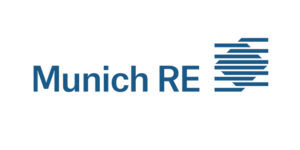
This year, the Pride at Munich Re employee network is receiving the award in the BIG IMPACT INITIATIVE category. The network launched the initiative ‘Column of Voices – BREAKING NEWS’. A homemade advertising column with self-designed posters drew attention to polarisation in society and the role of language and the media. As part of an exhibition, supplemented by an accompanying book, visitors were encouraged to think critically about the way they consume and share information. The initiative was rounded off by a TOGATHERING with PROUT AT WORK with the aim of promoting dialogue and developing approaches to overcoming social polarisation. The focus was on building bridges and strengthening mutual understanding.
RISING STAR AWARD:
bunt@dwd
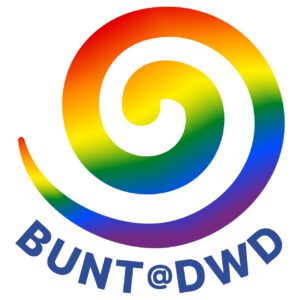
The BUNT@DWD network of the German Weather Service is being awarded the RISING STAR Award this year. The network implemented a social media campaign during this year’s Pride season that achieved a very wide reach – even outside the queer community. Under the title ‘CSD Weather’, the network published a weather forecast for the CSDs in major German cities on all of the German Weather Service’s social media channels one day before the parade. This enabled the network to reach people who previously had little contact with Christopher Street Day or queer issues in general.
GLOBAL LEADER NETWORK AWARD:
global ing rainbow lions
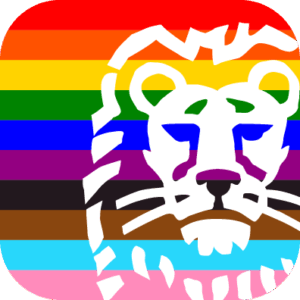
The GLOBAL LEADER NETWORK Award recognises the Global ING Rainbow Lions network, which is currently active in 23 countries, including Australia, Singapore, the Philippines, Germany, the Netherlands, Poland, the United States and many more. The network reaches over 86% of employees worldwide, which corresponds to more than 54,000 colleagues. At the heart of the global structure is the Network Board, which was established over two years ago. It brings together representatives from each local network to coordinate efforts, share best practices and amplify collective impact. This year, a two-day global conference was held in Warsaw, where 14 local networks from around the world met to discuss the future of queer inclusion in the company.
sustainability AWARD:
out pfizer employee network (open)

OPEN, Pfizer Germany’s LGBTIQ+ network, has been honoured with the SUSTAINABILITY Award from the PROUT AT WORK Foundation. With Pride@Work Awareness Sessions, sharing personal stories on Coming Out Day, and creative formats such as queer gaming after-work events, the network has been creating emotional connections and low-threshold opportunities for conversation for almost a decade. As part of the Pfizer DE&I team, OPEN is an integral part of the onboarding process for new employees. Senior leaders also show great appreciation and are actively involved. The focus is on promoting a working environment in which all employees can be themselves and develop their full potential.
QUEER DEEP DIVES are PROUT AT WORK’s format for intensive workshops on selected topics related to queer diversity. In April 2024, a DEEP DIVE on the topic of ‘(Queer) KPIs’ took place in cooperation with PROUT EMPLOYER METRO. A total of 25 representatives from various companies and industries took part in the one-day workshop in Düsseldorf to work out together how diversity measures can – and must – be made measurable.
KPIs (key performance indicators) are measurable metrics that companies can use to check whether they are achieving their strategic goals. In the context of a diversity strategy, KPIs refer to specific metrics that highlight the progress and impact of measures to promote diversity, equal opportunities, and inclusion.
At the same time, KPIs, especially in the area of queer diversity, are not without controversy because they touch on privacy, are often difficult to collect methodically, and can easily be misused. For example, if figures are used without reference to qualitative indicators relating to corporate culture, for example, they can also be used to roll back diversity measures.
Nevertheless, it is undisputed that concrete data and figures are becoming immensely important as supporting arguments for a corporate diversity strategy.
The workshop: KPIs in all shapes and sizes
This was precisely the balancing act that participants tackled in the one-day workshop. After two presentations by representatives from Accenture and Commerzbank, both of which already pursue a strategy based on diversity KPIs, the participants were divided into two groups. The aim of the first part of the workshop was to identify the areas in which performance indicators can be collected and the extent to which these contribute to a general measurability strategy. One group focused on diversity KPIs, while the second group looked at queer-specific KPIs.
The groups identified four specific areas in which there is either a need or already best practices for identifying performance indicators:
- Diversity dimensions in general
- Gender diversity
- Queer diversity from an HR perspective
- Queer diversity from a networking perspective
Through joint collection, discussion, and analysis at the individual workshop stations, a broad picture of possible measurement categories, methods, and focuses emerged.
Diversity KPIs: More than just bare figures
In addition to the numbers-driven view of diversity KPIs, there is an increasing focus on more qualitative and holistic perspectives that take a broader view of the role of diversity in the company. For example, compliance with legal requirements or the question of how benefits offered are actually used can provide insight into whether structures are truly inclusive. The governance of the company itself should also be considered from the perspective of whether decision-making processes and management mechanisms are designed to be inclusive.
Diversity KPIs can also be understood as a reflection of society, showing the extent to which a company is fulfilling its social responsibility and putting people first in their entirety – with regard to health, mental stress, migration experiences, or the subjective experience of belonging.
These less number-focused approaches make it clear that authentic diversity management not only serves to meet targets, but also promotes innovation, creativity, and corporate success. They contribute to expanding the employee pool, strengthen employer branding and corporate image, and show that every person in the company bears responsibility. At the same time, they act as a hygiene factor for respect and psychological and physical safety, reduce mental load, and contribute to corporate and societal responsibility. Ultimately, these perspectives also help strengthen democracy and the free market economy by highlighting diversity as a cornerstone of an inclusive, sustainable corporate culture.
The lively participation and keen interest of the attendees, as well as the need to have targeted arguments for diversity engagement, made the workshop a complete success. Much of the feedback focused on how the workshop opened up new perspectives and, above all, opportunities for collecting diversity KPIs. We are also taking this energy with us and incorporating it into the publication of a HOW TO guide on the topic of ‘(queer) KPIs’.
WE LOOK FORWARD TO WORKING WITH YOU – DEVELOPING WORKPLACE DIVERSITY
Let’s talk:
Follow us on Social Media!
Instagram: https://www.instagram.com/proutatwork/
LinkedIn: https://www.linkedin.com/company/proutatwork/
The PROUT AT WORK campaign day for companies, organizations, and institutions entered its fourth round in 2024. A good 50 campaigns and events were submitted during the six-week campaign period to show support for equal opportunities for queer people in the workplace under the motto “Show Your True Colors”.
In recent years, PRIDE DAY GERMANY has established itself as a fixture in the calendars of many companies and organizations. In 2024, the campaign day entered its fourth round and impressively demonstrated how important and effective the commitment to queer diversity and equal opportunities is. With a variety of campaigns, events, and initiatives, PRIDE DAY GERMANY sent a strong signal for a colorful corporate world and equal opportunities for all – regardless of a person’s sexual orientation or gender identity.
Show Your True Colors
Under the motto “Show Your True Colors” we succeeded in sending a widely visible message of diversity. A special highlight of this year’s motto was the campaign of the same name. The result of a collaboration with the TV show “Glow Up” we had access to exceptional portrait photos taken by star photographer Armin Morbach. The impressive portraits were displayed on a large scale in the subway stations of Munich, Hamburg, Berlin, and Cologne, as well as during Pride Week in Cologne. This brought the idea behind the motto to the public: every person should be able to live freely, confidently, and visibly.





Copyright: Armin Morbach
Campaigns and highlights: #WeMeanPride
The centerpiece of PRIDE DAY GERMANY 2024 was the diverse range of activities and events that took place over a six-week period. The campaign period began in early June and culminated in the official PRIDE DAY GERMANY on July 4. Under the hashtags #WeMeanPride and #ShowYourTrueColors, the PROUT AT WORK Foundation called on companies, organizations, and institutions to submit their events and thus make their commitment visible.
With almost 50 campaigns, a new record was set in 2024. The range of measures was impressive:
- Workshops and training courses: Companies offered training courses on topics such as queer-inclusive language, anti-bias, and intersectional approaches to diversity work.
- Creative activities: From rainbow-colored building lighting to art exhibitions and Pride running events, there were no limits to creativity.
- Digital formats: Livestreams, podcasts, and digital Pride talks offered employees the opportunity to participate, regardless of their location.
Each action helped raise awareness of queer issues, break down barriers, and advance the dialogue on queer inclusion.
Successful PRIDE DAY CONTEST 2024
Another highlight of PRIDE DAY GERMANY was the PRIDE DAY CONTEST, which once again attracted a large number of participants this year. Companies and organizations were able to submit their campaigns to the contest and ultimately secure a place among the three audience favorites in an open public vote. The winners of the PRIDE DAY CONTEST proved that commitment can not only inspire, but also bring about tangible change.
In 2024, the public vote was only one part of the contest. We highlighted the audience favorites on social media, where they had the opportunity to comment on their campaign with a quote. We also selected three best practices from the submitted campaigns and presented them to the audience at the PROUT AT WORK conference 2024 with lead partner OTTO. This time, special attention was paid to highlighting different levels and formats of commitment to queer diversity. From the public sector, to an outstanding collaboration between diversity management and networking, to an initiative that placed a special focus on strengthening the queer network internally.
An outlook: The future of queer diversity
PRIDE DAY GERMANY 2024 showed once again that diversity and inclusion in a corporate context do not have to be a matter of goodwill. Diversity and the strategic handling of it are core elements of every corporate culture and an indispensable part of a company’s own future viability.
Especially in times when this fact seems to be up for debate again, it is not only about the visibility of actions, but also about sustainability and profound change in corporate structures. Initiatives such as PRIDE DAY GERMANY are not just a day of action, but an impetus for long-term commitment.
Follow us on Social Media!
Instagram: https://www.instagram.com/proutatwork/
LinkedIn: https://www.linkedin.com/company/proutatwork/
PROUT DIVERSITY LEADERS is a platform for diversity managers and HR managers where they can learn about best practices, exchange approaches and ideas with sparring partners, and develop hands-on initiatives together. The events focus primarily on practical exchange and insights into everyday diversity work.
Safer spaces in companies
On July 12, 2024, people who are really into diversity got together at PwC Germany in Frankfurt am Main to chat about “Companies as safer spaces.” The goal was to figure out ways to make the workplace a safe space for marginalized people, especially during times of global crises and social change.
The participants discussed the fundamental question of the social positioning of companies and the motivation behind it, the specific needs of marginalized groups, and the creation of a framework for a balanced culture of discussion.
Diversity from an intersectional perspective
In the workshop, participants explored all dimensions of diversity. At the same time, PROUT AT WORK’s expertise meant that the focus was on queer diversity. Participants agreed that diversity and inclusion must be actively practiced every day and implemented at all levels.
This requires structures such as regular awareness-raising measures and credible complaint mechanisms. While structures are often created and supported by diversity management and company management, queer employee networks and employee resource groups also play an important role in the perception of companies as safe spaces. This is because they are visible on the issue, spread knowledge, and can establish concrete contact with trusted individuals.
Creating structures
In a second round of workshops, the topic of structures was revisited and explored in greater depth. Clear structures and transparency enable safer spaces to be given a framework that ensures legitimacy and visibility within the company and facilitates processes.
Finally, the participants addressed the following question: How, with what, and what is communicated internally and externally? The participants discussed the cornerstones of transparent, holistic, and authentic communication on diversity and safer spaces.
Impressions from the event
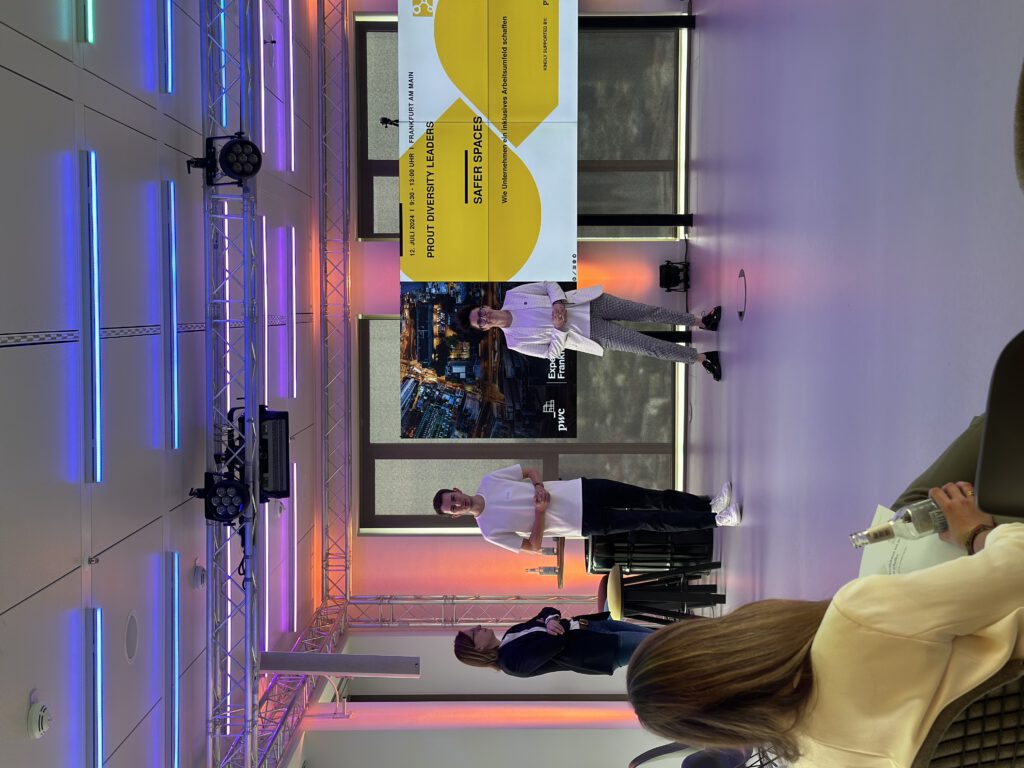
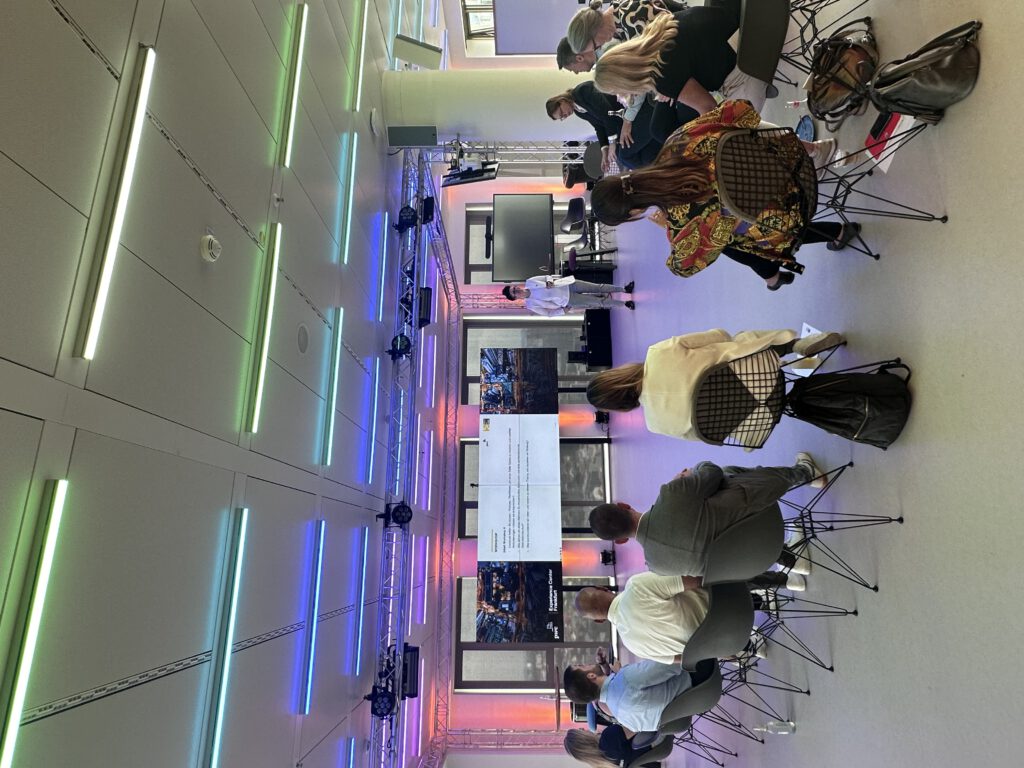
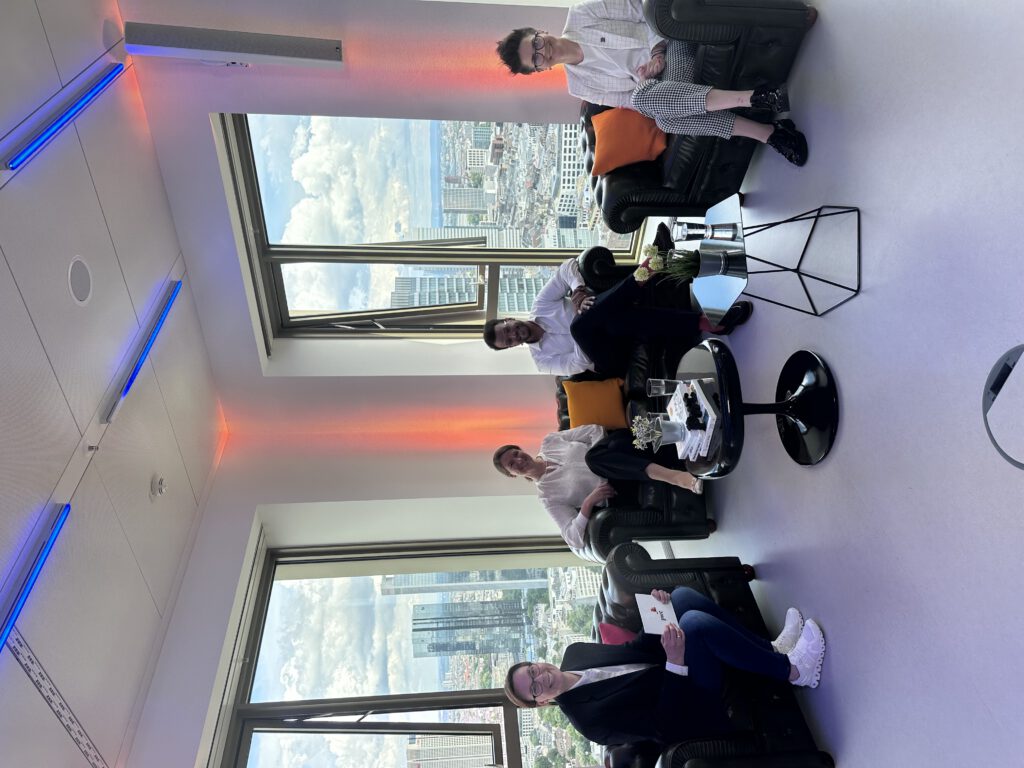
An overview of the event format and upcoming editions of PROUT DIVERSITY LEADERS can be found here:
Are you interested in this format and want to learn more about it?
Let’s talk:
Follow us on Social Media!
Instagram: https://www.instagram.com/proutatwork/
LinkedIn: https://www.linkedin.com/company/proutatwork/
Different areas of work within companies bring different challenges – especially when it comes to raising awareness of queer issues in the workplace. While employees in office structures are easily accessible via intranet, email, or digital learning platforms, reaching out to employees in other areas is much more difficult. Employees without a fixed PC workstation – such as those in logistics, warehouses, or sales – often have tightly scheduled workflows. Time slots for traditional workshop formats are much more difficult to integrate, and digital information channels often do not work here.
Comprehensive awareness-raising activities at the IKEA logistics center
These were precisely the challenges addressed by a joint awareness-raising event organized by the PROUT AT WORK Foundation and PROUT EMPLOYER IKEA on November 28, 2024, at the logistics center in Dortmund. The aim was to reach as many employees as possible from different areas of work—but especially those working in the warehouses of the logistics center. The concept: low-threshold, entertaining formats that can be flexibly integrated into everyday working life.
Throughout the working day, the event offered a total of seven short intensive sessions, for which employees could register in advance in groups and for which they were given time off work. In approximately 20-minute sessions, basic information on sexual and gender diversity was conveyed in a clear, practical manner, always with room for specific questions and personal concerns. Immediately afterwards, there was time for discussion and exchange: a valuable moment in which uncertainties could be clearly addressed and spaces for dialogue opened up.
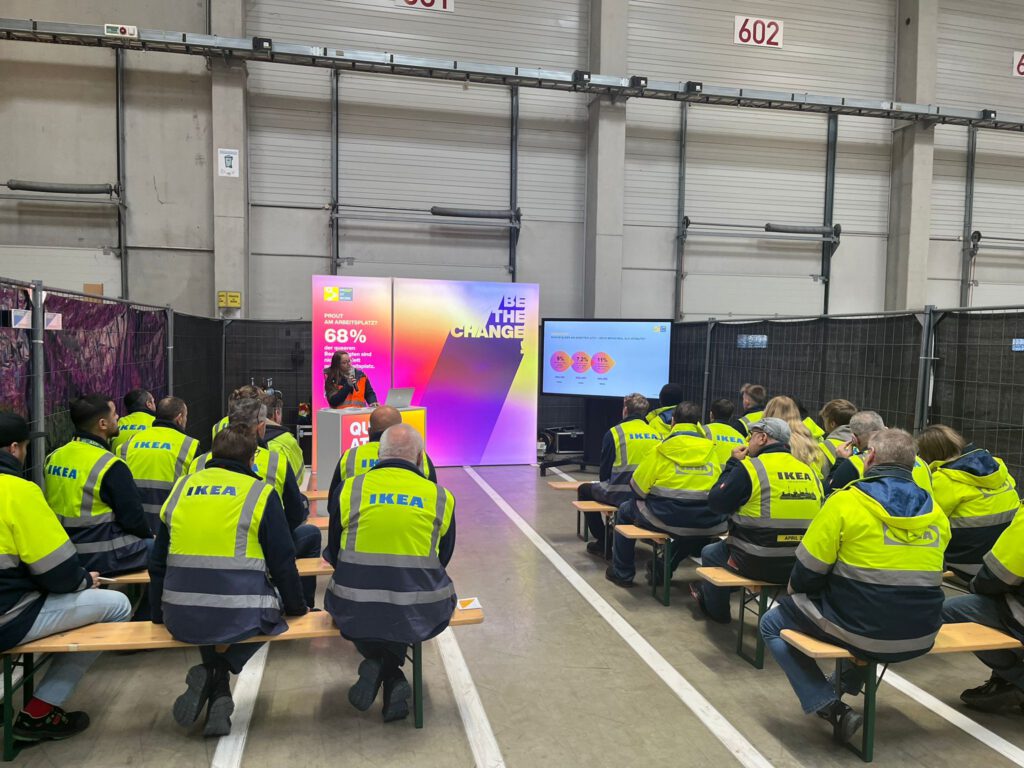
Goal: Raising awareness and reducing prejudice
One special element was the reflection exercise, which gave each participant the opportunity to examine their own attitudes and any prejudices they may have. This exercise was deliberately kept low-key and was intended to encourage reflection without overwhelming or lecturing participants.
The high level of participation showed that the concept worked: many employees from a wide range of departments took advantage of the offer throughout the day. This highlighted how important it is not to offer awareness-raising activities exclusively in a digital or centralized format, but to meet people where they are – in the midst of their everyday work, between shelves, storage areas, and forklifts.
The event in Dortmund was an example of how an inclusive corporate culture can be promoted even outside of traditional office structures. It was a step toward greater visibility for queer issues and a work environment in which diversity can truly be lived. Detlev Blenk, Equality, Diversity & Inclusion Manager at IKEA Germany, reports:
“At IKEA, we consider raising awareness and educating people about LGBTQIA+ issues to be a core part of our diversity and inclusion work. In the field of logistics in particular, many different perspectives and worldviews come together. That’s why it was very important to us to engage in conversation with many logistics professionals at one of our IKEA central warehouses in Dortmund, together with PROUT AT WORK. The success speaks for itself – and it wasn’t just on the day of the workshops that the topic of ‘queer’ was the talk of the town.”
The fact that the event was so well received encourages us to offer it again in 2025, together with IKEA.
Are you interested in this format and want to learn more about it?
Let’s talk:
Follow us on Social Media!
Instagram: https://www.instagram.com/proutatwork/
LinkedIn: https://www.linkedin.com/company/proutatwork/
An important milestone for the queer community in 2024 was the enactment of the Self-Determination Act (SBGG) on November 1, 2024. For many, this represents an improvement. Nevertheless, there is also criticism from within the queer community. The SBGG falls far short of addressing the needs of trans*, inter* and non-binary (tin*) individuals.
Status quo and criticism
From August 1, 2024, transgender people will be able to register a change of gender and first name(s) at the registry office. It will no longer be necessary to submit a medical certificate. For children under the age of 14, only their legal representative can submit the declaration. Those aged 14 to 17 can submit it themselves with the consent of their legal representative.
The possibility of changing one’s name and gender entry without a psychological assessment is very valuable – even if the circumstances are not ideal. One of the points of criticism is the three-month waiting period that must be observed before a change can be made, as well as the one-year waiting period after a change. It is now no longer possible to change one’s name without changing one’s gender entry, which does not reflect the reality of life for non-binary people. Apart from the formal aspects, the law offers too little security for people without German citizenship and does not generally protect against discrimination.
PROUT AT WORK has observed the process and agrees with the criticisms of the tin* interest groups, but supports the long-overdue abolition of the Transsexuals Act (TSG) as a first step.
The impact of the SBGG on companies
The changes left many companies wondering what measures they needed to take and what they could do to support queer employees and ensure smooth operations. To provide assistance in this area, PROUT AT WORK has revised its Guide No. 9, “Trans* and Transitions in the Workplace,” and included all relevant changes to the SBGG. This keeps PROUT EMPLOYER and all interested companies and individuals up to date.
As part of this process, the guide was translated into English pro bono by Becky Lavin. Even though the Self-Determination Act is specific to Germany and we can therefore only provide international companies with an insight into German regulations, the rest of the content and best practices still offer valuable assistance – regardless of where the company is based.
We are pleased to now be able to offer the guide in an adapted, up-to-date form and in English. If you have any further questions on the topic, we are available to provide support beyond the guide or, if you are interested, we can hold an awareness session on trans* and non-binary issues.
Are you interested in this format and want to learn more about it?
Let’s talk:
Follow us on Social Media!
Instagram: https://www.instagram.com/proutatwork/
LinkedIn: https://www.linkedin.com/company/proutatwork/
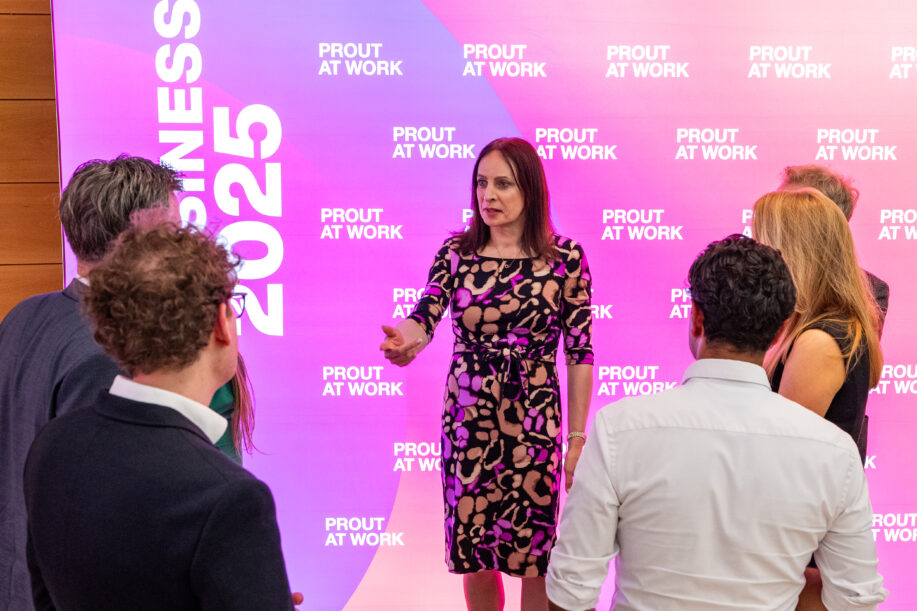
Caroline Farberger
“If you’re not actively including, you’re probably unconsciously excluding.”
A clear signal for diversity, equity and inclusion (DEI): many companies are restricting their DEI programs and activities and giving in to political pressure. This was also discussed by the guests at this year’s DINNER BEYOND BUSINESS.
Albert Kehrer, CEO of the PROUT AT WORK-Foundation, also emphasized the importance of queer diversity and equal opportunities in the world of work: “We at PROUT AT WORK are convinced that diversity in itself, but also queer diversity, is good for the company, because diverse teams are demonstrably better than homogeneous groups.”
At the foundation’s 8th DINNER BEYOND BUSINESS, the focus was on the commitment of companies and managers to queer employees: “We are convinced that different perspectives are essential for innovative ideas, and innovation is at the heart of everything we do. For 140 years, we have been guided by our guiding principles – respect, empathy, trust and passion – so that all employees can work with pride and appreciation. The DINNER BEYOND BUSINESS of PROUT AT WORK is a valuable platform to enter into a dialog about exactly this, to learn from each other and to jointly set impulses for more equal opportunities,” says Médard Schoenmaeckers, Chairman of the Board of Managing Directors of Boehringer Ingelheim Deutschland GmbH.
Caroline Farberger shared private insights in her keynote speech
Over 50 senior executives from major companies and institutions accepted the invitation to DINNER BEYOND BUSINESS 2025, including representatives from Accenture, BASF, Commerzbank, Deutsche Telekom, Deutscher Wetterdienst, IKEA, Linklaters, MSD, Novelis, OTTO and ZDF. The participants of the top-class networking event enjoyed an exclusive dinner at Boehringer Ingelheim’s headquarters in Ingelheim am Rhein. Albert Kehrer explained the background to DINNER BEYOND BUSINESS in his welcoming speech: “The idea for PROUT AT WORK was born 20 years ago, when the inclusion of queer people in business was not yet a big issue. We all see that politics in some countries are restricting diversity topics and the rights of queer people. That’s why we invited people to DINNER BEYOND BUSINESS 2025 to learn more about the queer side of business. To listen to leaders who are part of the queer community themselves. Supporting queer people in the workplace is much more than just supporting a marginalized group.
The highlight of the evening was the keynote speech by Caroline Farberger, Board Executive, Investor, G7 Advisor and Speaker, about her personal experiences as a trans* woman and CEO and diversity as a business advantage.
“I was born a boy, but back then I didn’t know about other gender identities. I realized that I only had one chance to live my life the way I am. I thought: What kind of role model would I be as a parent if I don’t live my life authentically?”
Caroline Farberger is the first high-ranking executive in the Nordic countries to speak openly about her transition. Until 2022, she was CEO at ICA Insurance, a well-known Swedish insurance company. She is currently a board member, investor and speaker.
“In Europe, we need to increase our productivity and competitiveness. With our stagnating population, we can only achieve this, if we really make full use of the diversity of our workforce. This requires a conscious decision by each individual to embed inclusion in their behavior and leadership style. If you don’t actively include, you are likely to unconsciously exclude.”
INsight
Many thanks to the host of this year’s DINNER BEYOND BUSINESS:
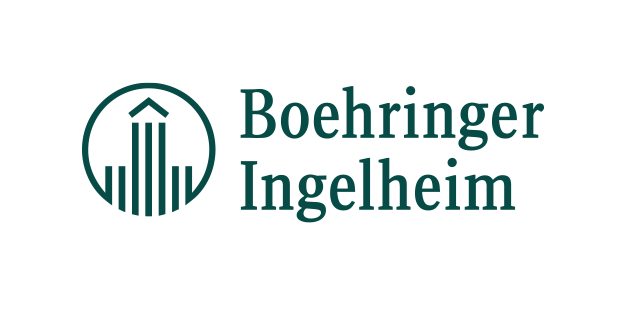
Under this motto, numerous regional network meetings with workshop elements on a wide range of queer topics in the workplace took place in 2024. What makes these events so valuable is the cross-company exchange and the broad diversity of perspectives from small companies to large corporations.
‘Hate speech on the intranet’ with BASF on April 9, 2024 in Ludwigshafen
In preparation for Pride Month, this TOGATHERING focused on dealing with anti-queer comments and hate speech on internal channels and deliberately expanded the group of participants to include communication specialists. Together, helpful approaches were developed in order to be able to act both preventively and actively. The interaction of network, D&I and comms – for comprehensive expertise – was identified as an important factor. Afterwards, all participants were invited to a classical music concert, which also took place in BASF’s Feierabendhaus.
‘How To: Sustainable networking in a fluid working world’ with EY on April 15, 2024 in Berlin
Networks are strong and established institutions – but they need to be based on sustainable commitment and diverse participation in order to develop their full potential. The participants intensively discussed how structures and tools can ensure consistency in networking in an increasingly fluid working world. At the same time, they exchanged views on networking that takes place across many locations and on cooperation with D&I.
‘Intersectionality’ with Deutsche Post DHL on May 16, 2024 in Bonn
On the occasion of IDAHOBIT (International Day Against Homo-, Bi-, Inter*- and Trans*Hostility), a TOGATHERING on the topic of intersectionality took place at the Post Tower in Bonn. The event shed light on what intersectional approaches can look like within the queer community. In addition, the participants developed inspirations for intersectional work between the different company networks. Following the event, the Post Tower was illuminated with the colorful lettering “delivered with pride” as a visible sign of IDAHOBIT.
‘Role Models – Embracing Diversity’ with Audi on June 27, 2024 in Neuburg an der Donau
Contrary to the usual schedule, this TOGATHERING started in the afternoon with a driving experience for all participants on the Audi site in Neuburg an der Donau. After this special experience and introductory words from the then CMO Henrik Wenders, the participants focused on the roles and tasks of role models in various areas – from executives to the network to the production area.
‘Queer diversity in times of multiple crises’ with Freshfields Bruckhaus Deringer on September 5, 2024 in Berlin
We are living in times of multiple crises and social change – from pandemics, war and inflation to the rise of far-right forces. As a result, there is a noticeable increase in hate crimes – especially for marginalized groups. The overarching commitment of all actors is necessary to form a counterbalance to exclusion and discrimination. This TOGATHERING focused on the sphere of influence of companies: How can an attitude towards queer diversity be demonstrated and how can safer spaces be designed for employees?
‘Queer perspectives on top management – from executive allies to queer career paths’ with Hays on September 17, 2024 in Mannheim
Queer diversity must be anchored at all levels of the company. An important pillar for the successful and sustainable implementation of queer diversity is the commitment of top management. Imke Mahner, CPCO Germany and CEMEA at Hays, made her support for the topic visible both in her welcoming speech and through her participation in the discussions.
‘Queer Diversity meets advertising agencies – diversity-sensitive communication’ with Pahnke Group and the Gesamtverband Kommunikationsagenturen GWA on October 21, 2024 in Hamburg
Diversity-sensitive communication – in words, images and attitudes – serves to make people’s differences visible and overcome exclusion without reproducing stereotypical role models. The challenges are often authentic campaigns that skillfully combine diversity and brand message. After a theoretical input on gender-sensitive language, the participants focused on the concrete implementation of diversity-sensitive communication and also reflected on influencing factors such as the composition of teams.
‘Out & Proud – Queer Authenticity in the Workplace’ with MunichRe on November 7, 2024 in Munich
Growing acceptance ensures that people can express their gender identity and sexual orientation ever more freely and authentically – in a wide variety of ways and according to their individual ideas. Social notions of authenticity and professionalism are evolving and stereotypical expectations are being challenged. At this TOGATHERING, participants addressed the question of how an open and inclusive environment can be promoted – an environment that goes beyond clothing and promotes a holistic recognition of identity.
‘Big Impact ERG – appreciative and successful networking’ with Capgemini, MAN and Microsoft on November 25, 2024 in Munich
Three companies joined forces for this TOGATHERING to discuss the importance and role of employee networks in the company with numerous participants from different companies. In particular, challenges in day-to-day networking, connecting elements across many locations and integration into the external positioning of the company were discussed. The large number of different perspectives enriched this event at Capgemini’s premises in a special way.
You can find an overview of the upcoming TOGATHERINGS here:
Are you interested in this format and want to find out more?
Let’s get into the
conversation:
Follow us on Social Media!
Instagram: https://www.instagram.com/proutatwork/
LinkedIn: https://www.linkedin.com/company/proutatwork/
The Queer in Law & Consulting event format initiated by PROUT AT WORK shows how similar the challenges and needs are within an industry – and how enriching the exchange of experiences can be. Originally focused purely on law firms, the Queer in Law event format, which PROUT AT WORK has been offering since 2022, has now become a cross-industry exchange that connects law firms and consultancies. The aim is to jointly create new impetus for more queer inclusion.
Consulting as a new perspective
In 2024, the Queer in Law format was taken a step further: together with PROUT AT WORK, the participants expanded the circle to include management consultancies and auditing firms. This is because both sectors share the structure of the companies, the nature of the services provided to customers and clients and much more. At the same time, the differences and the respective view from the outside open up new fields of learning and starting points.
Successful kick-off: Queer in Law & Consulting 2024
The first joint workshop took place on January 22, 2024 with representatives from law firms and consultancies at PROUT EMPLOYER Linklaters in Frankfurt am Main. The central questions were:
- What unites us, what makes us different?
- What can we learn from each other?
- How can we support each other across industries?
During the event, the spirit of this format came into focus in particular: when the topic of competition is left at the door and everyone stands together for one cause – namely queer inclusion – then open discussions, joint initiatives and learning through exchange are the result.
The workshop program included an input on current studies on queer people in the world of work as well as a substantive contribution from the host company and PROUT EMPLOYER Linklaters on the topic of ESG and diversity. In a breakout session, the participants worked in depth on the requirements and (improvement) possibilities of ESG strategies. A brainstorming session provided numerous clues as to how queer inclusion can be taken into account in everyday working life with a view to ESG.
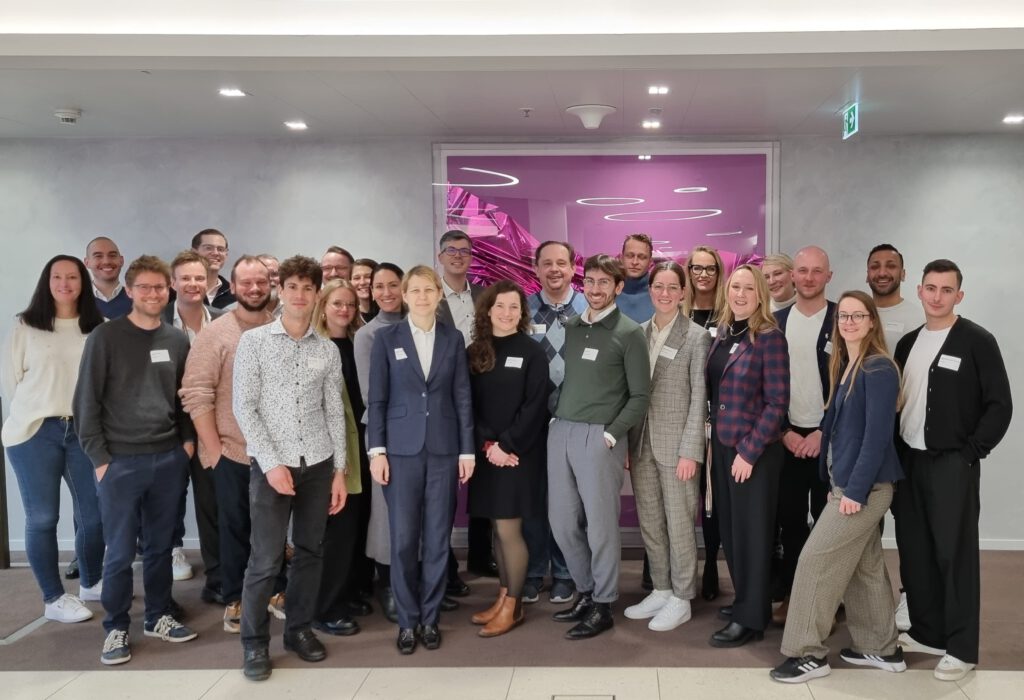
Acting together – across industry boundaries
Once again, the exchange – and also the expansion of the circle of participants – enabled important discussions and conversations and further strengthened the basis for joint action in the matter. Fabienne Kasper, People Development & DEI Manager Germany at Linklaters, also emphasized this summary:
“In January 2024, the now established Queer in Law & Consulting Roundtable kicked off at our firm, after a cross-firm exchange had already been initiated. The inclusion of management consultancies and auditing firms enriches the dialog even more. Due to our similar business models, strengths and challenges, the exchange between professional services firms on DEI topics is particularly valuable in order to learn from and with each other and to expand the network. All players are united by the pursuit of an inclusive culture and fair opportunities for all.”
Are you interested in this format and want to find out more?
Let’s get into the
conversation:
Follow us on Social Media!
Instagram: https://www.instagram.com/proutatwork/
LinkedIn: https://www.linkedin.com/company/proutatwork/
On the 13th German Diversity Day organised by Charta der Vielfalt e.V., the PROUT AT WORK Foundation is joining forces with 13 companies to make it clear that diversity remains – despite restrictions against diversity, equity and inclusion (DEI) in companies.
The #DiversityBleibt campaign launched by the PROUT AT WORK Foundation is in favour of diversity, equity and inclusion (DEI) in companies – despite current developments that restrict diversity in the workplace.
This development against DEI programmes and initiatives is a clear step backwards – both for queer employees and for the economic success of companies. Studies clearly show this:
- The more diversity management measures are implemented in the workplace, the more openly employees deal with their gender or sexual identity at work.¹
- The more open respondents are (or can be), the higher their job satisfaction, the stronger their commitment to the organisation and the more convinced they are that they are making a valuable contribution at work.¹
- European companies with mixed teams are over 60 per cent more likely to be more profitable than average.²
- Companies with a high level of gender diversity are 25% more likely to be more profitable than average (in 2014, the figure was 15%). If we consider the factor of ethnic diversity (internationality of the board of directors), this value is even 36%.³
Companies make it clear: We stand up for diversity in the world of work
Together with 13 companies, the PROUT AT WORK foundation is sending out a clear signal in favour of diversity in the world of work. The following companies have joined the #DiversityBleibt social media campaign, which is published on the social networks LinkedIn, Instagram and Facebook: Audi, Beiersdorf, Campana & Schott, Edelman, NORD/LB, NTT DATA, OTTO, R+V, Randstad, REWE Group, Roland Berger, Solaris and Vinci Energies.
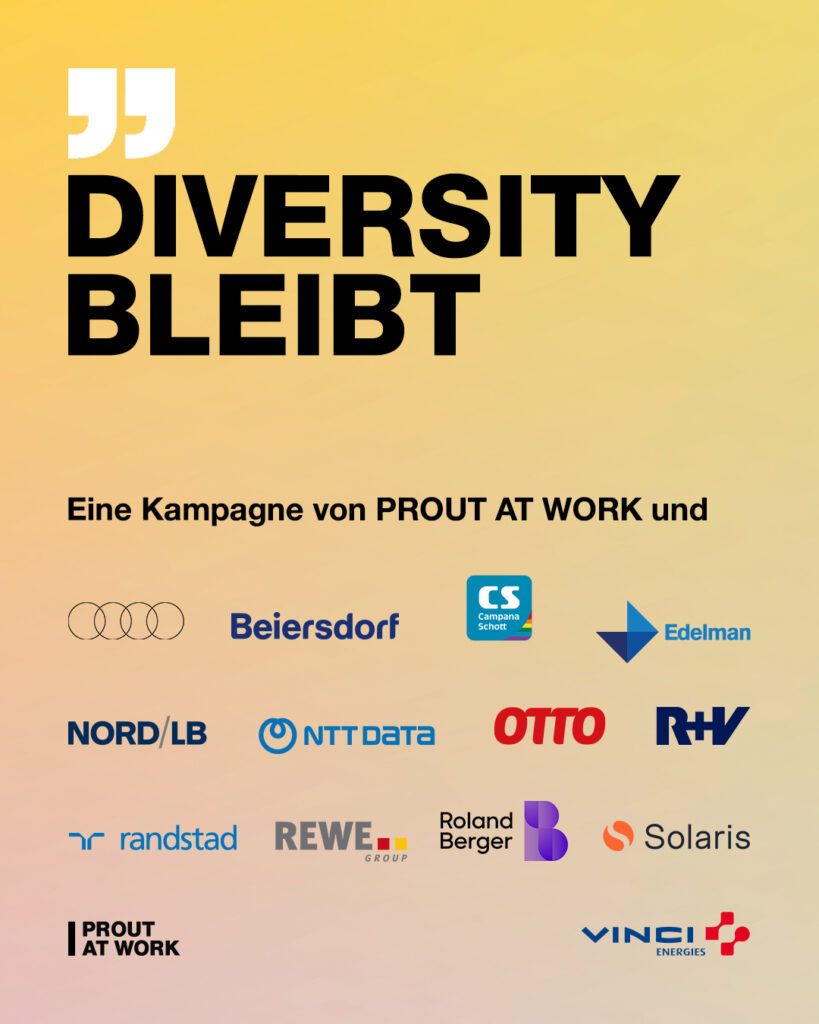
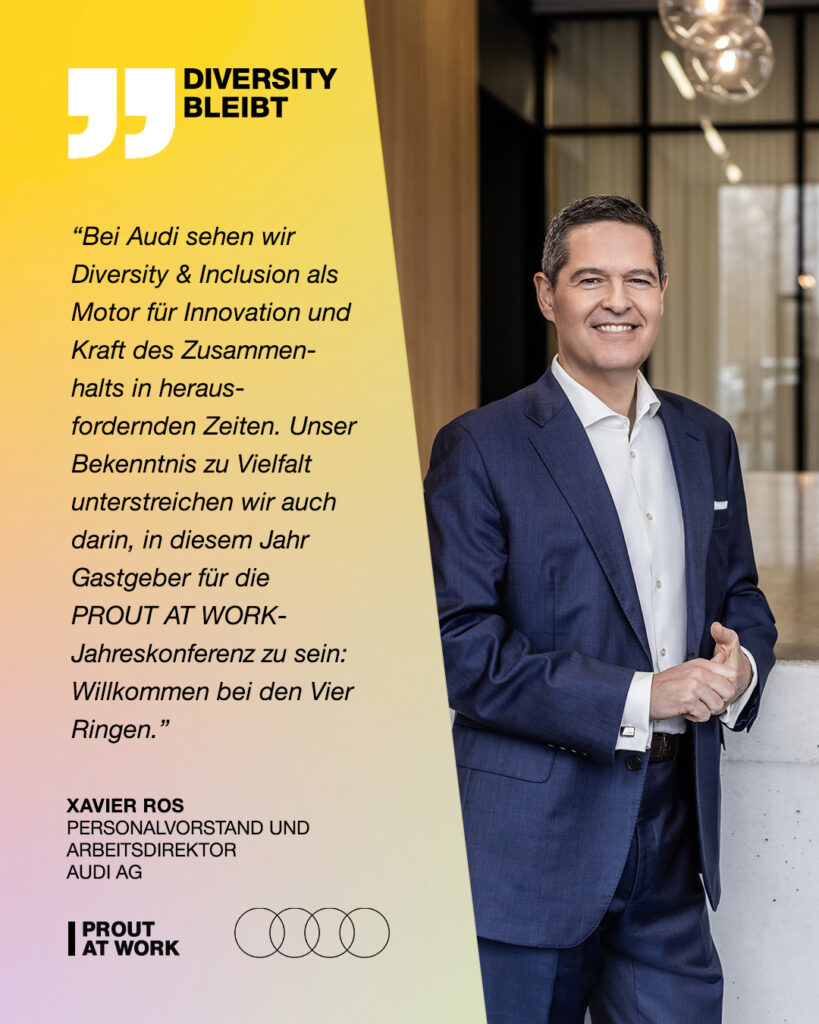
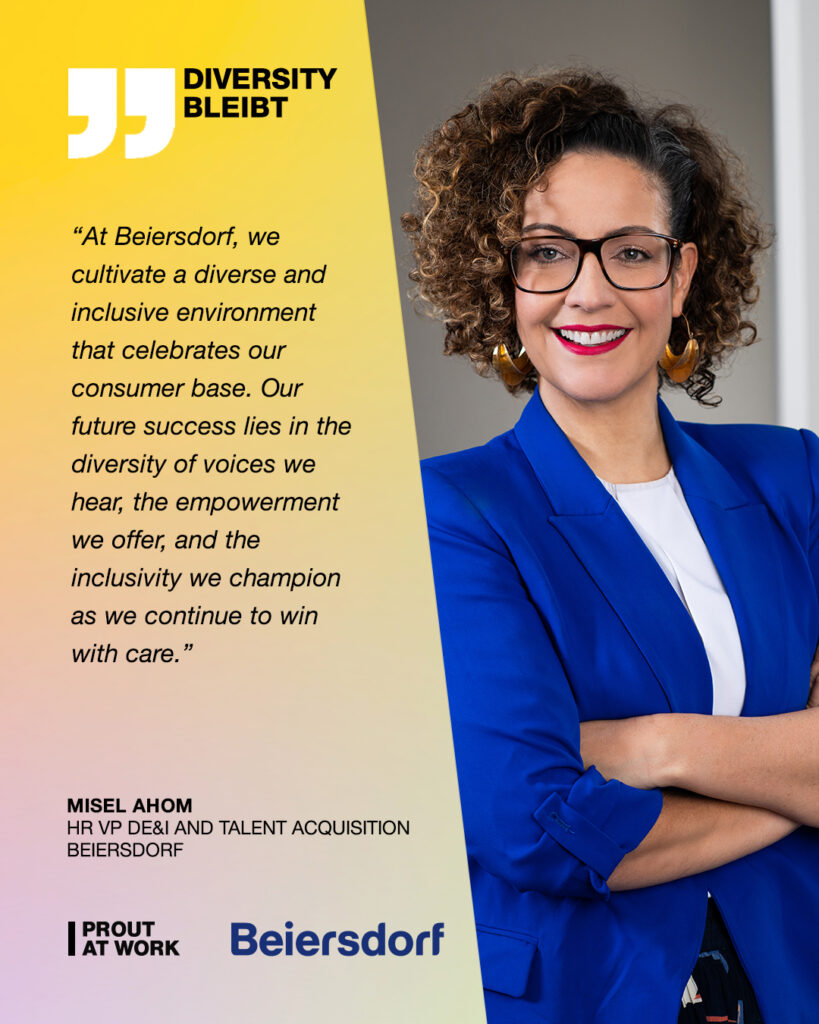
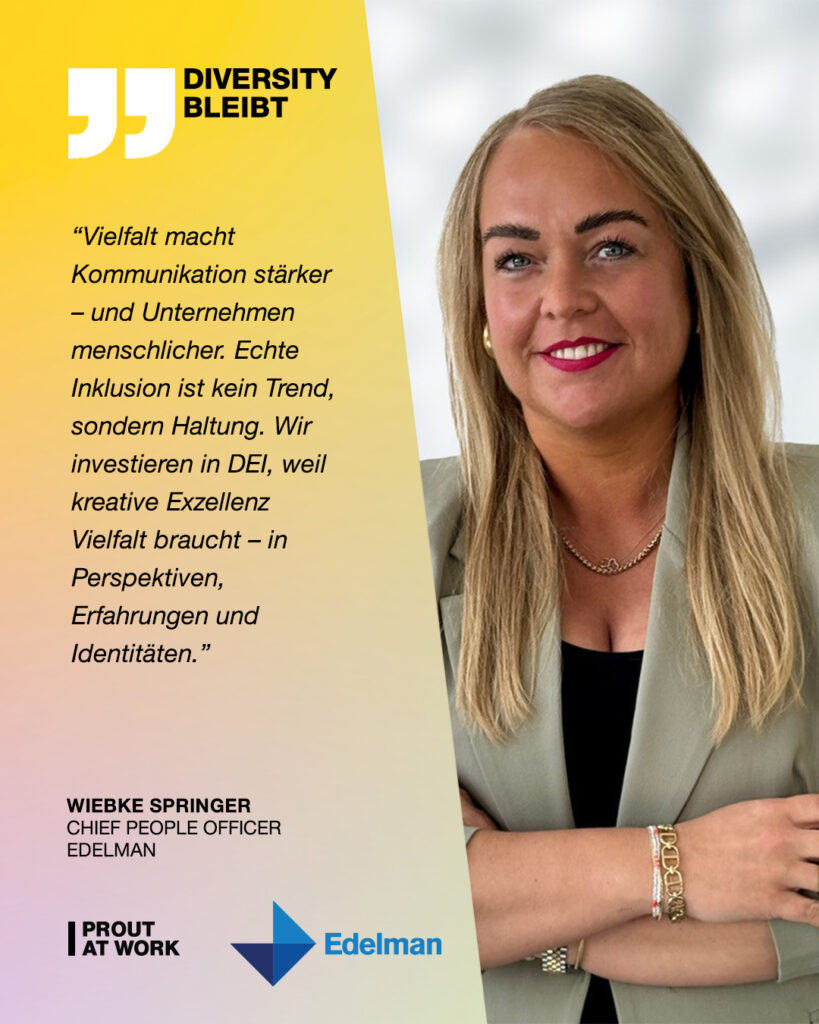
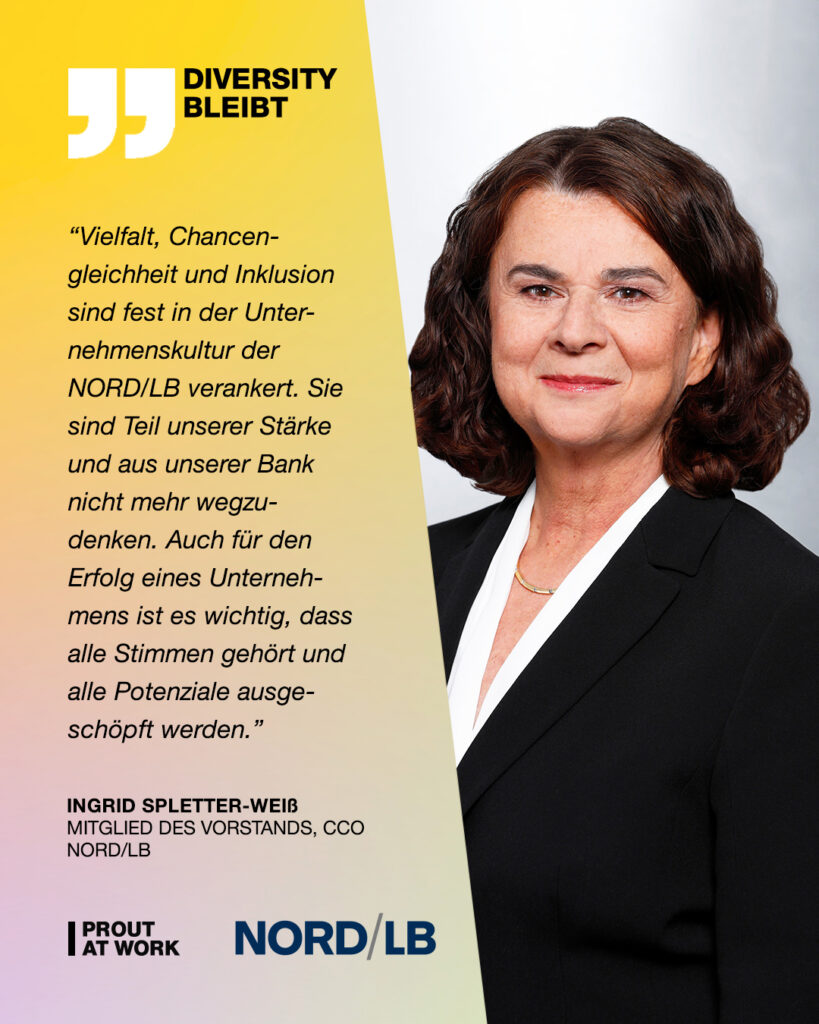
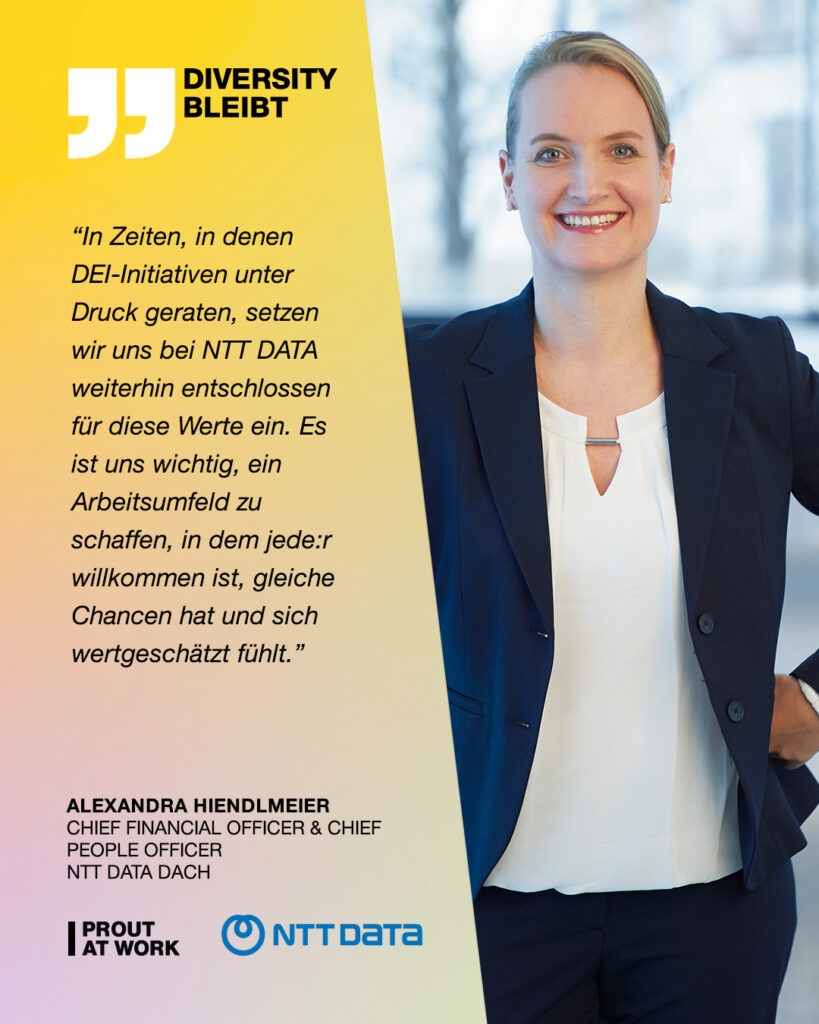
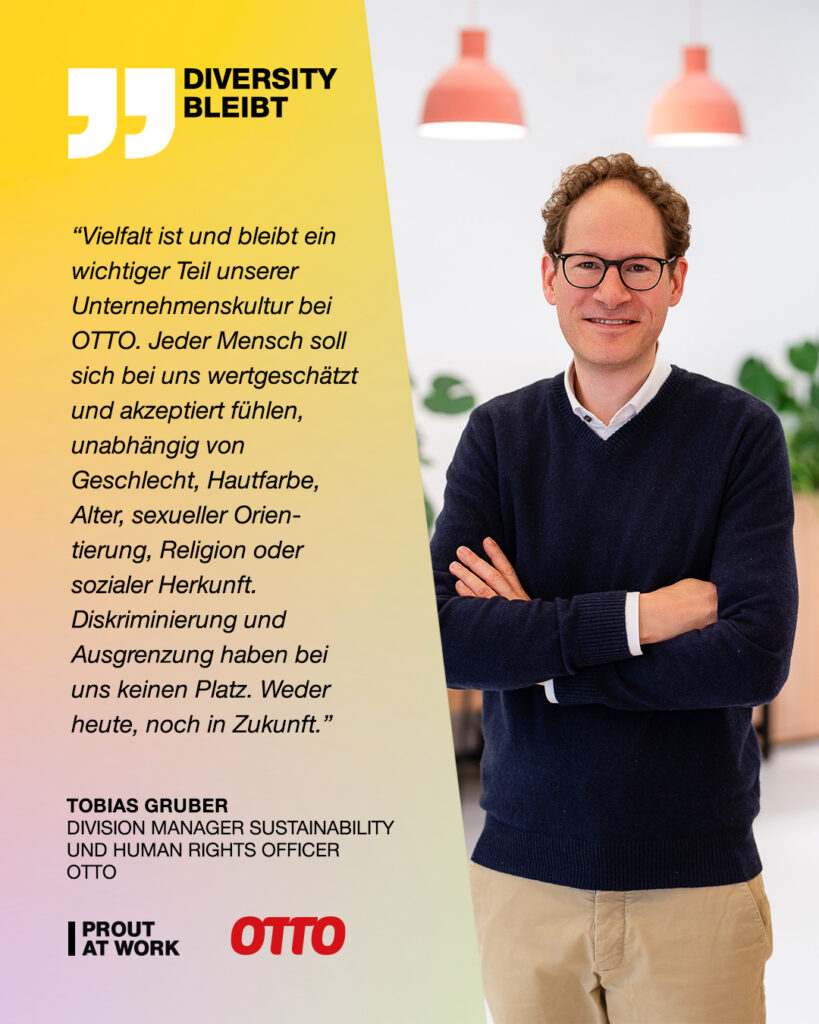
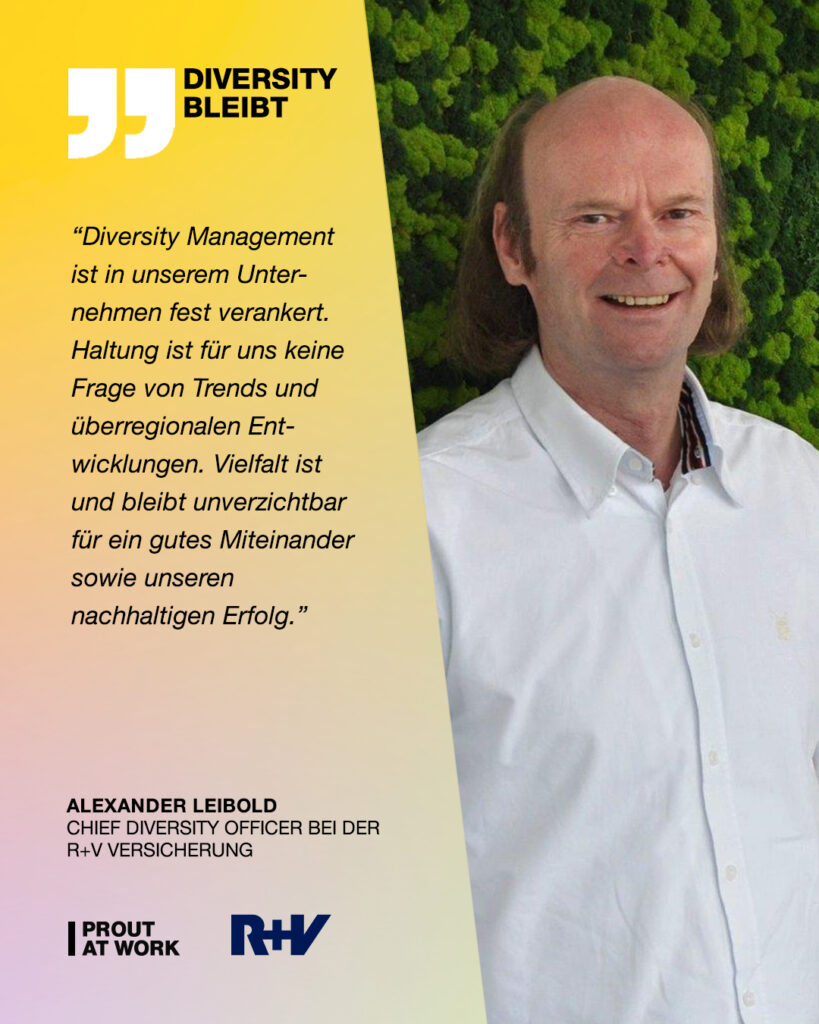
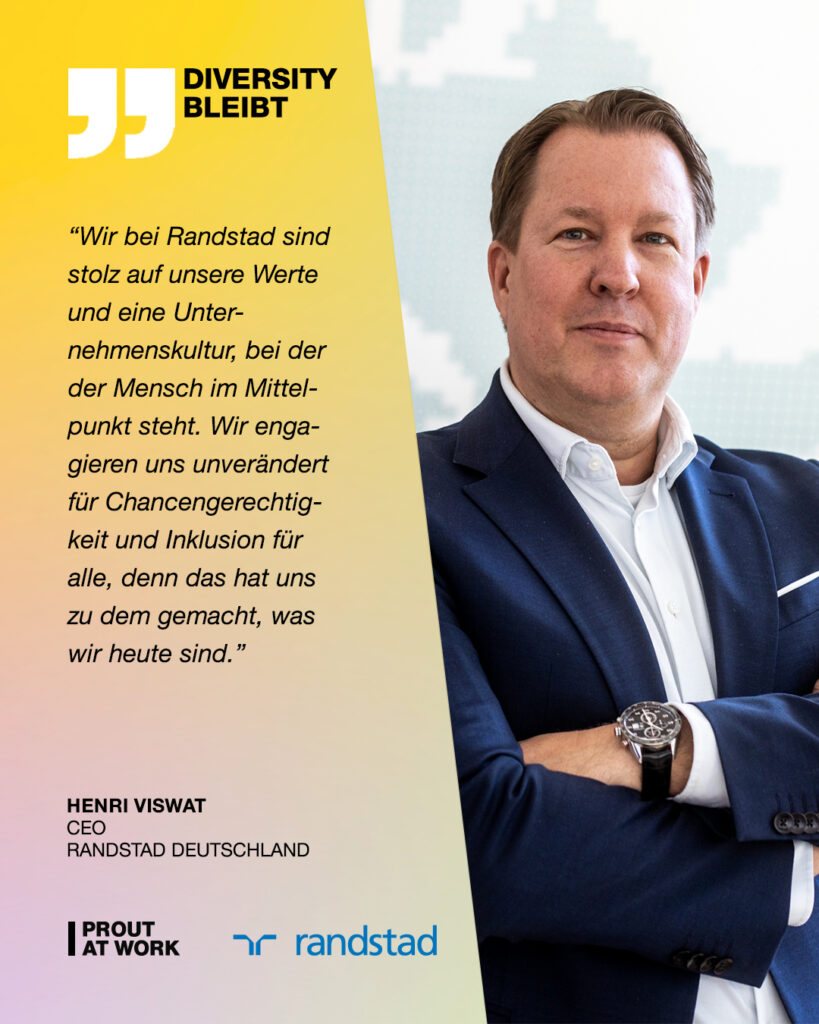
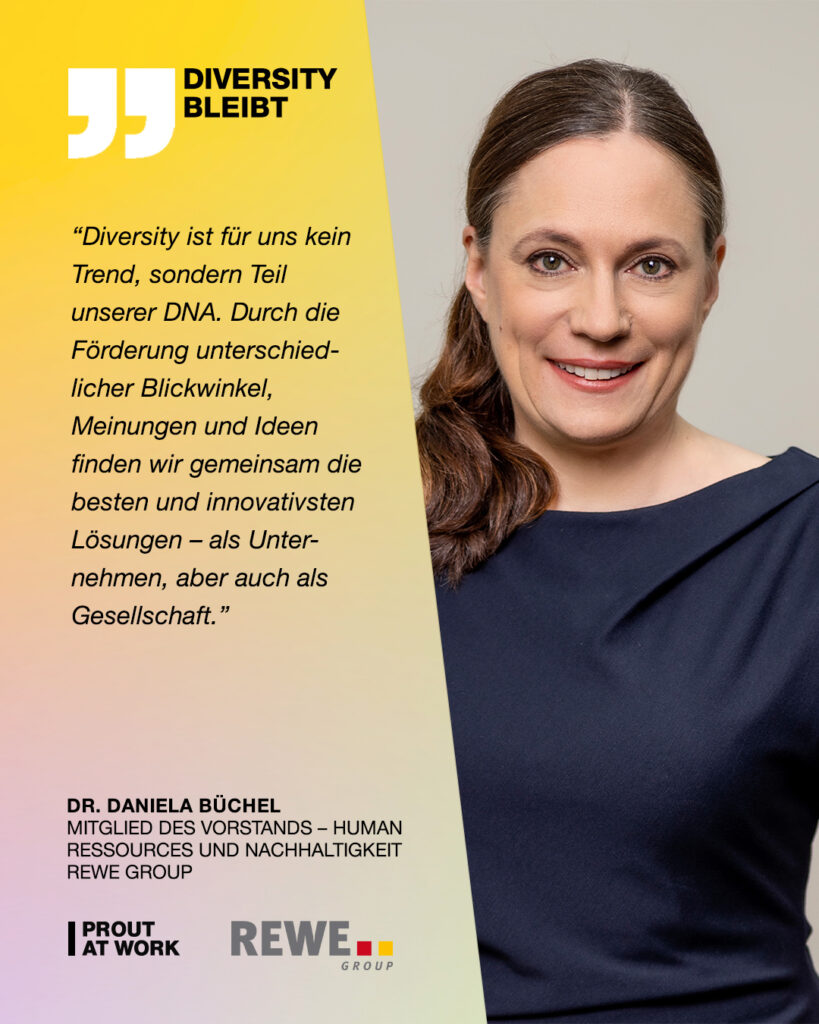
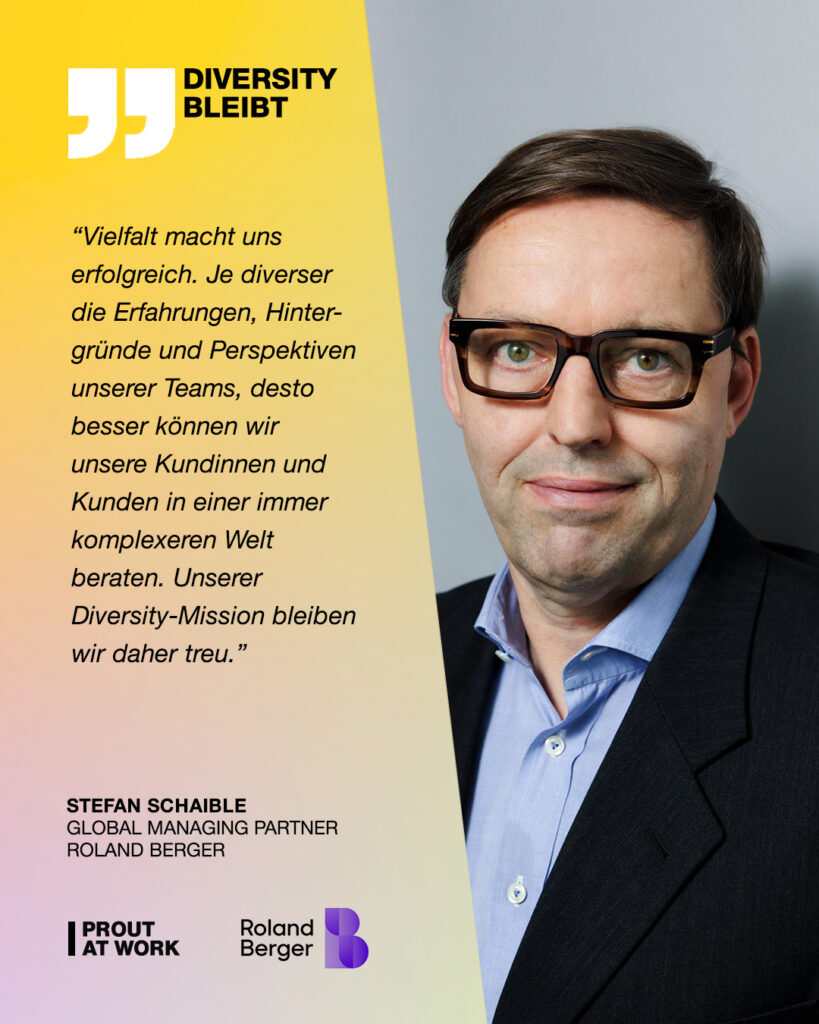
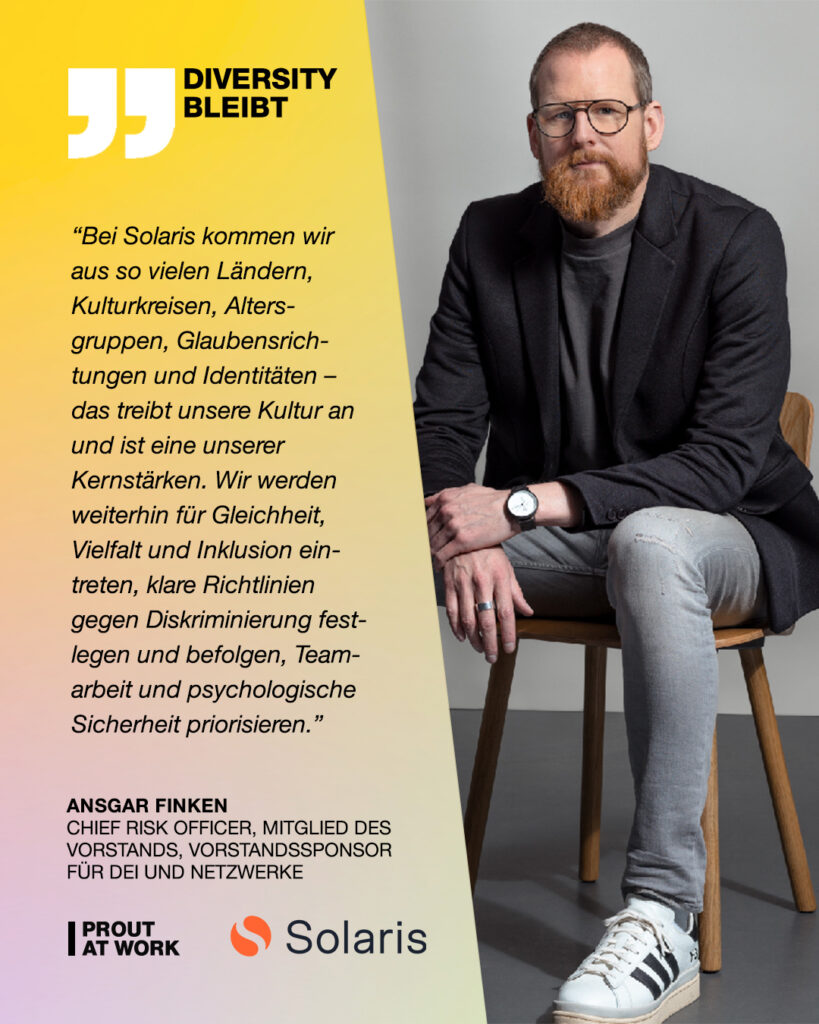
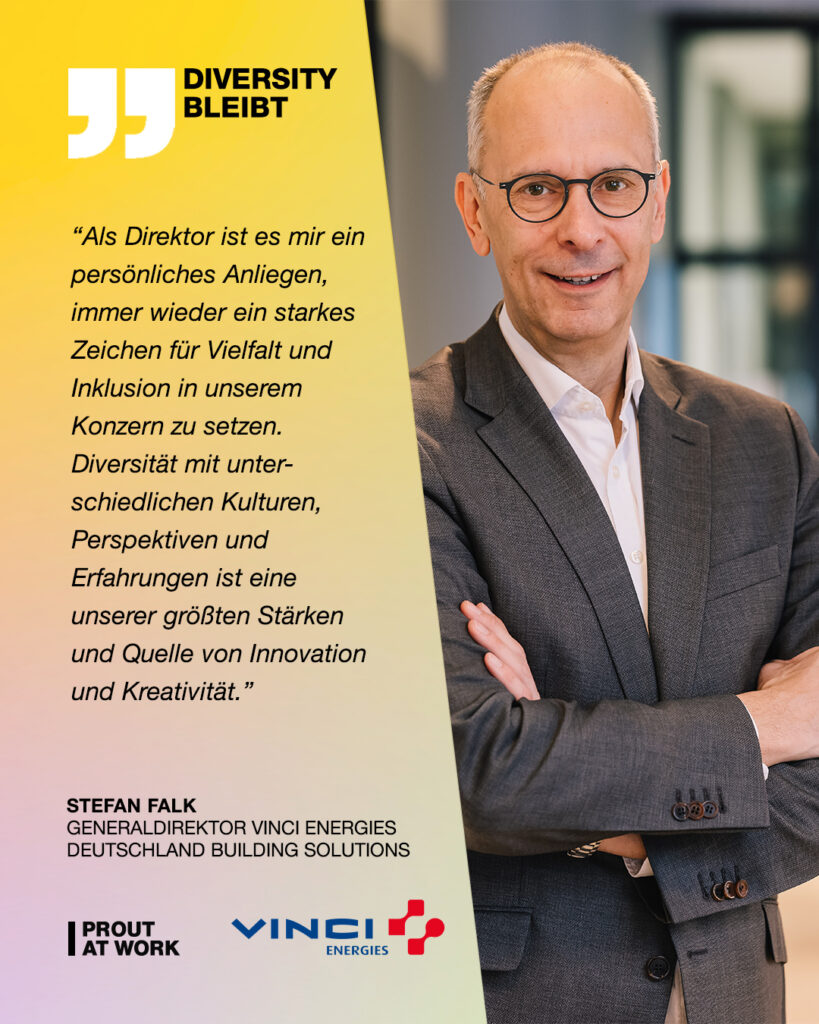
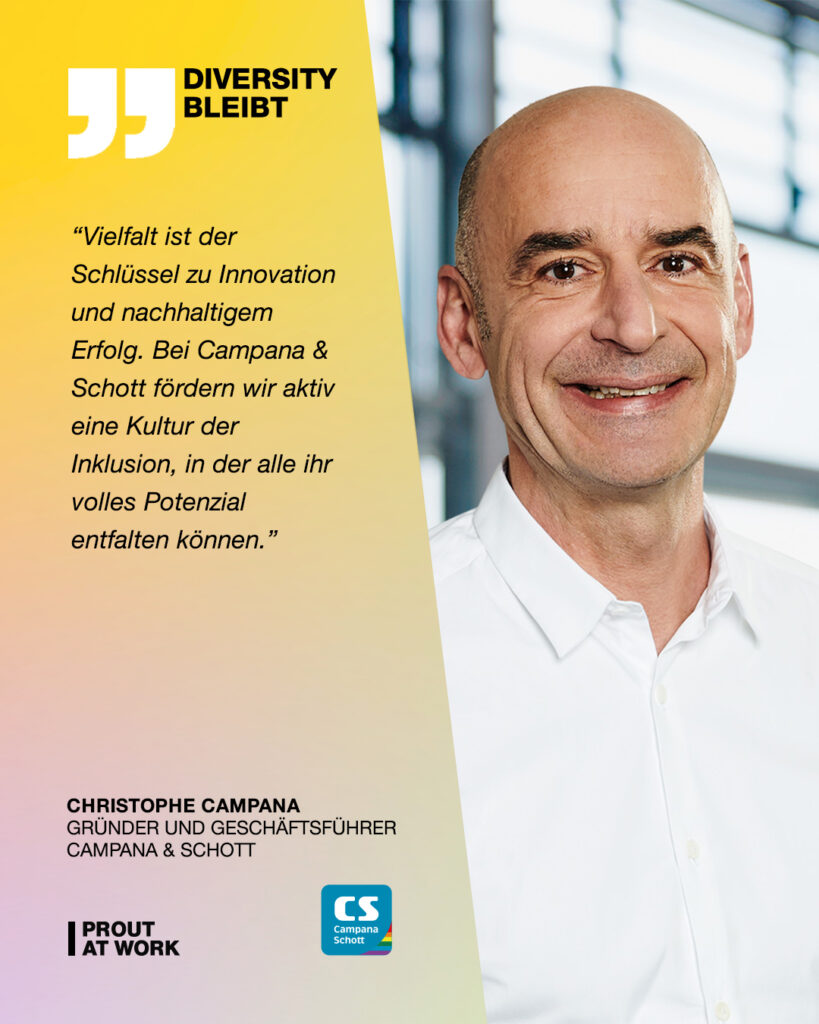
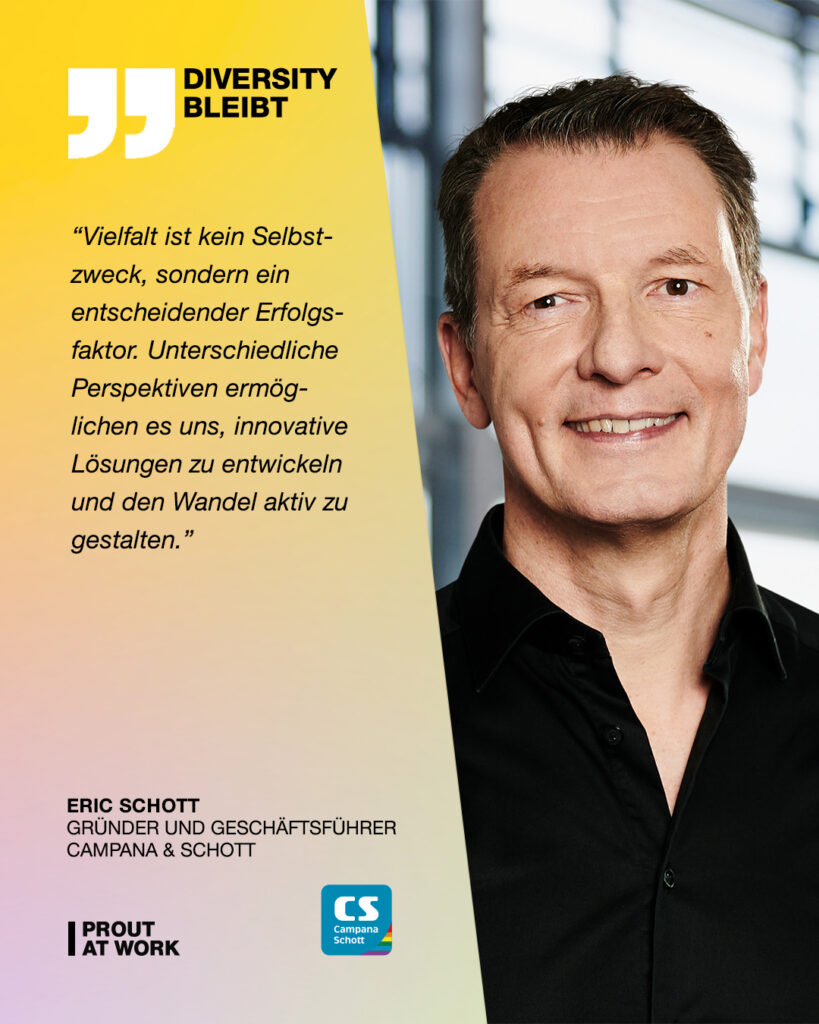
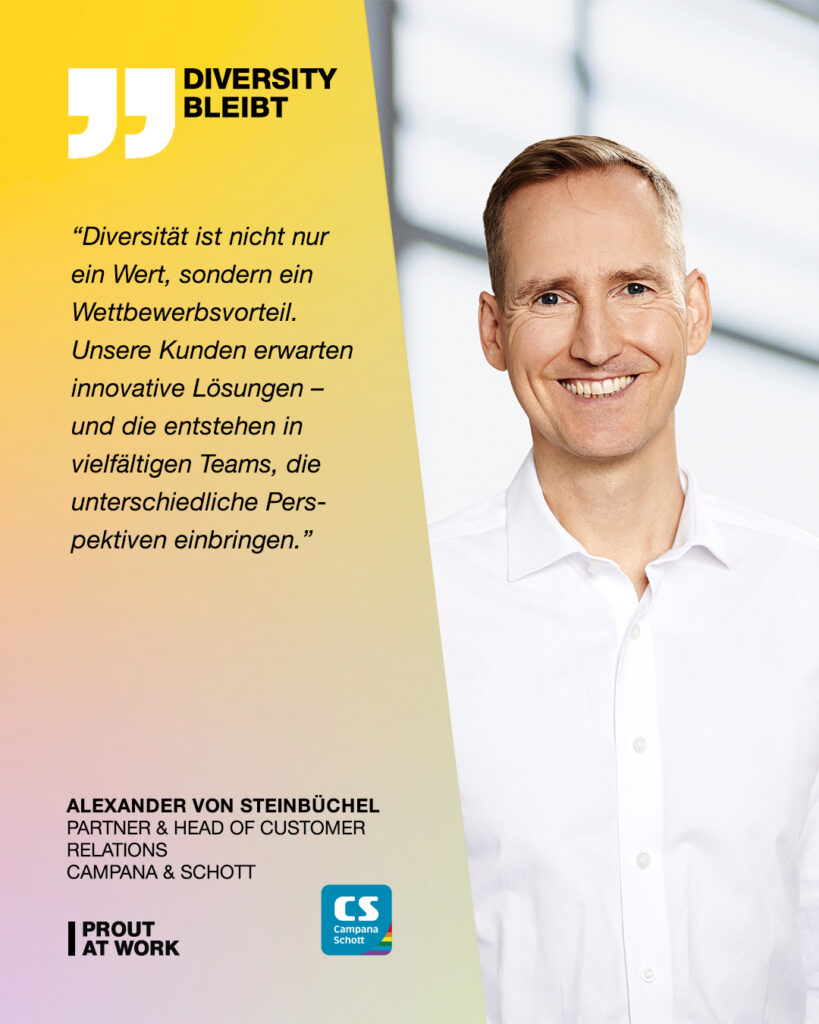
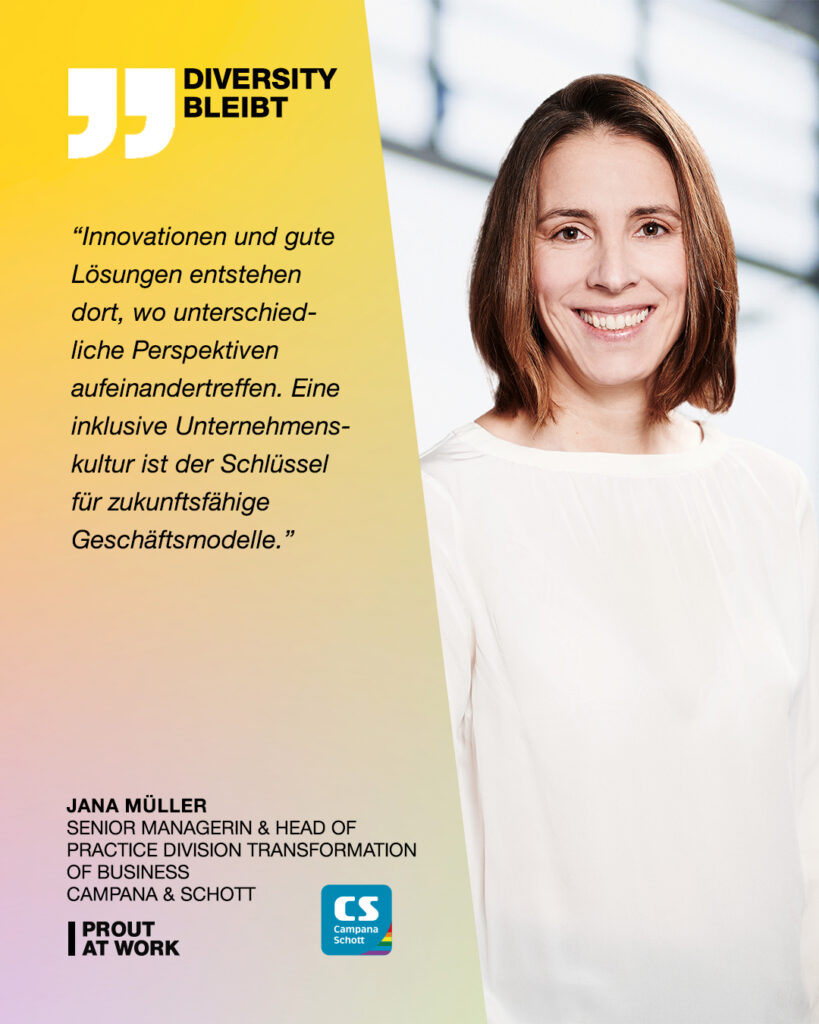
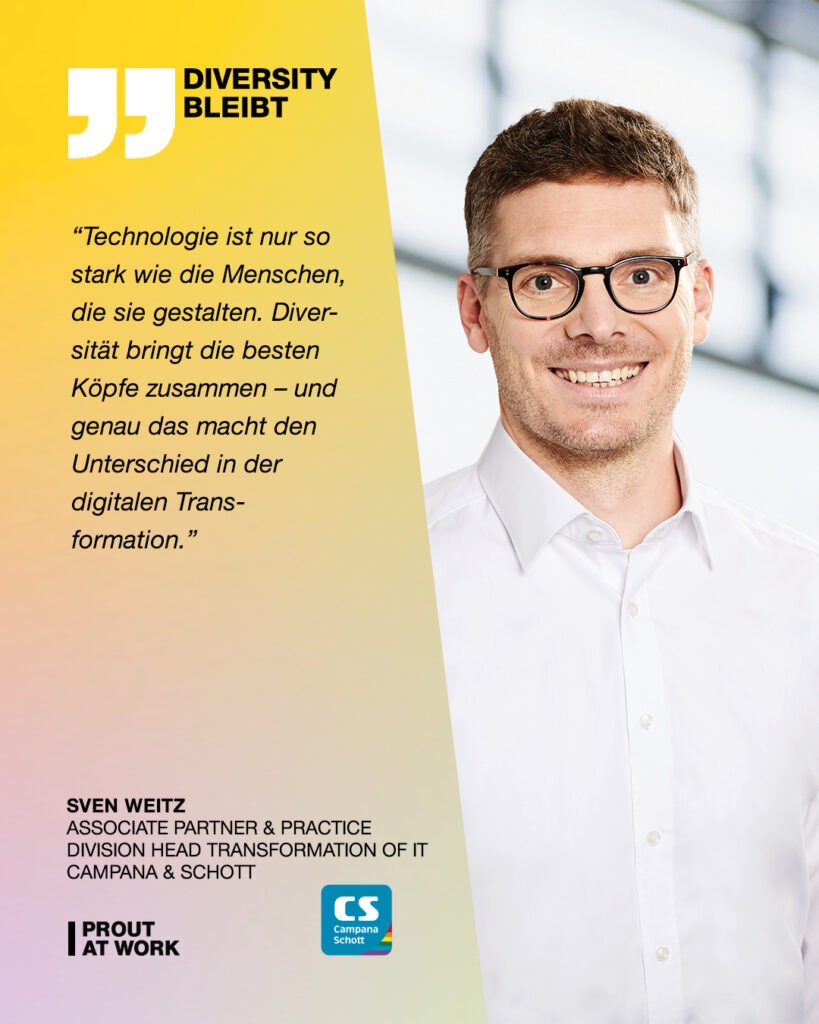
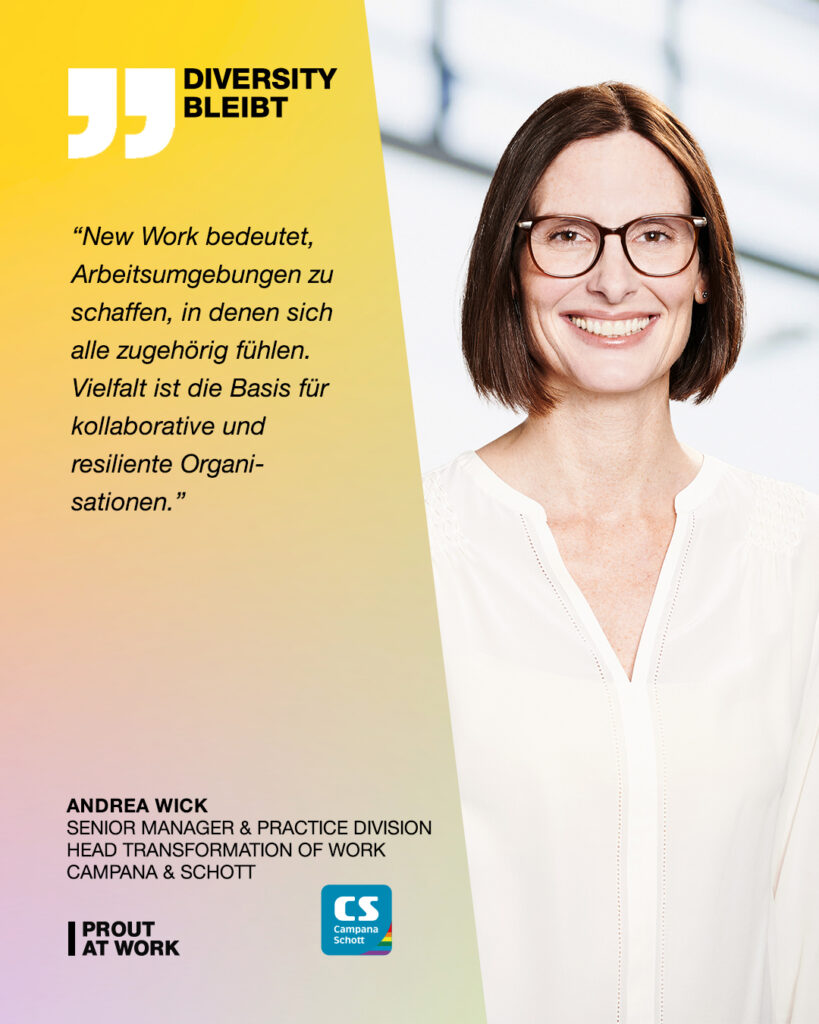
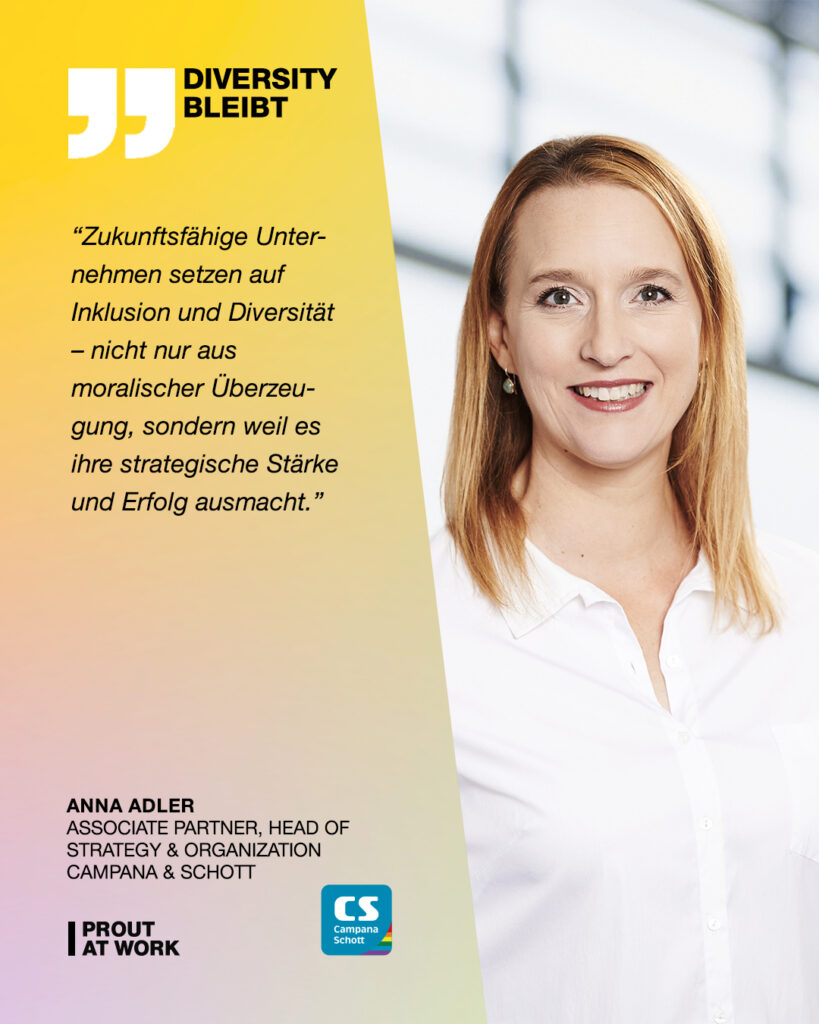
With numerous statements, the companies make it clear why they continue to implement measures for diversity, equity and inclusion (DEI) and thus welcome people of any sexual orientation, gender identity, social or ethnic origin, religion and ideology, physical and mental abilities and any age in the company and promote respectful coexistence.
‘We are delighted that so many companies have joined the ‘Diversity stays! We currently need to stand together even more and speak out in favour of diversity and equal opportunities in the world of work despite the headwind from the USA. The response to the campaign shows me that our work for queer diversity is bearing fruit and is being recognised in companies. Nevertheless, we also need to be visible outside our bubble and convince people who have little contact with the topic of queer diversity in the workplace.’ – Albert Kehrer, CEO of PROUT AT WORK
Sources:
¹Frohn, D. & Heiligers, N. (2024). »Out im Office?!« Die Arbeitssituation von LSBTIQA* Personen in Deutschland. IDA | Institut für Diversity- und Antidiskriminierungsforschung.
²Diversity matters even more (2024). McKinsey & Company.
³Diversity wins: How inclusion matters (2020). McKinsey & Company
Follow us on Social Media!
Instagram: https://www.instagram.com/proutatwork/
